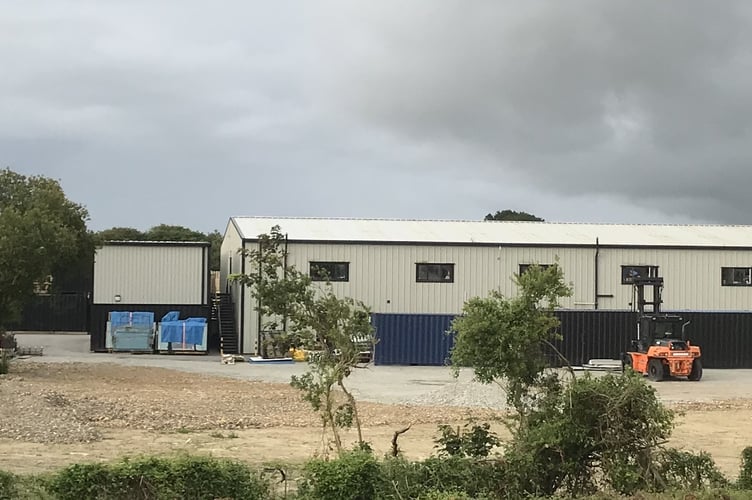CAMPAIGNERS are disappointed plans to site storage containers at a Newquay nature reserve have been approved on appeal.
Planning Inspector Tobias Gethin has granted Prow Park Business Village at Treloggan Industrial Estate planning permission for a change of use of land at Trencreek Meadows for parking, storage and the siting of storage containers.
He concluded the proposed development does not conflict with planning policy which supports development where there would be no significant adverse impact on the character of landscape areas.
Cornwall Council’s central sub area planning committee had turned down the retrospective plans following concerns about the harm the development has on the land.
Residents of Bedowan Meadows and Trencreek have campaigned against the plans after the owners of Prow Park removed trees and vegetation on the site during the bird nesting season from April 2022 onwards and installed around 20 storage containers and parked cars on the land without planning permission.

The Inspector said: “The main issue is the effect of the proposed development on the character of the surrounding area.
“The submitted ecological appraisal sets out that, both before and after the clearance works, the on-site habitats, such as scrub and mature broad-leaved woodland, are common and neither protected nor defined as notable (priority) habitats.
“However, it identifies that the development proposed would result in a substantial loss of on-site habitat, and that various animals including protected species were likely to be present/have used the site prior to the clearance works.
“With only a small amount of woodland remaining, the clearance and unauthorised works done to date have clearly therefore resulted in extensive habitat loss and the obvious potential for wildlife to have been harmed.
“I recognise that various parts of Prow Park have only become lawful via numerous certificates of lawfulness for existing uses/development.
“However, the available evidence indicates that the extent and amount of development at Prow Park is, excluding the appeal site, now largely lawful.
“Irrespective of its planning history, Prow Park and the adjoining industrial estate therefore form part of the character of the surrounding area and the context within which to judge the appeal proposal.
“With the site having already been cleared and planning permission not required for that, any offences that could have occurred relating to, for example, protected species particularly regarding clearance during the nesting season or tree felling would be a matter for the appropriate authority.
“I recognise that local residents do not wish to see the loss of trees and other habitat from the site and its replacement elsewhere.
“Although the storage may be used by domestic customers, it would also be available for use by businesses, including in Prow Park and the wider industrial estate.
“The development would therefore provide additional infrastructure that would help businesses to grow and operate more efficiently.
“The appeal proposal would also generate some employment from construction works and the landscaping of the site, and the subsequent need to manage and maintain it.
“Consequently, there would be various economic benefits arising from the scheme.
“In addition, whilst the clearance and subsequent development have clearly resulted in a significant net loss in habitats and biodiversity on the site to date, some on-site habitat and the improvement of off-site habitat can be secured by condition to offset the losses and achieve an overall net gain.
“The Environmental solutions consultant proposes some on-site measures.
“This includes a living wall and the creation of open mosaic habitats bordering the retained woodland.
“Although I share the concerns raised by third parties regarding the alleged area available for the latter, the proposed site plan does show space for some habitat creation along the site’s northern and eastern boundaries.
“Planting in these albeit relatively narrow corridors would also help to re-connect existing habitats.
“It seems to me that the habitat creation necessary to offset the losses and achieve a net gain can be realised.”
Campaigners are raised concerns the scheme could lead to flooding but the Inspector did not agree.
Mr Gethin said: “Significant concern has been raised with regards to drainage and flooding, with the removal of much of the ‘wet woodland’ on the site and other vegetation and the laying of a large area of impermeable hard surfacing resulting in loss of a natural flood protection and drainage.
“However, whilst the surrounding area is said to be noted for flooding, the site is not identified as being in a critical drainage area, the lead local flood authority did not object and the council has not identified the issue as a reason for refusal.”
Campaigners are now hoping Cornwall Council, which owns around 65 per cent of the land, decides against selling it to the owners of Prow Park.
They were like to see the land given to the community so that the habitat can be restored.
Resident Andy Keast said: “We are extremely disappointed with the decision after all the evidence that was provided showing the damage that has been done to the environment, the ecology and the impact on the community
“We have had it confirmed that Cornwall Council has still not sold the land so there is still hope.”

.jpg?width=209&height=140&crop=209:145,smart&quality=75)


